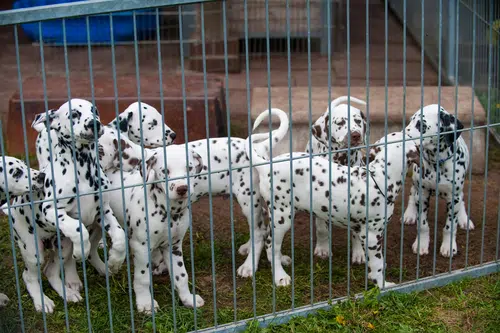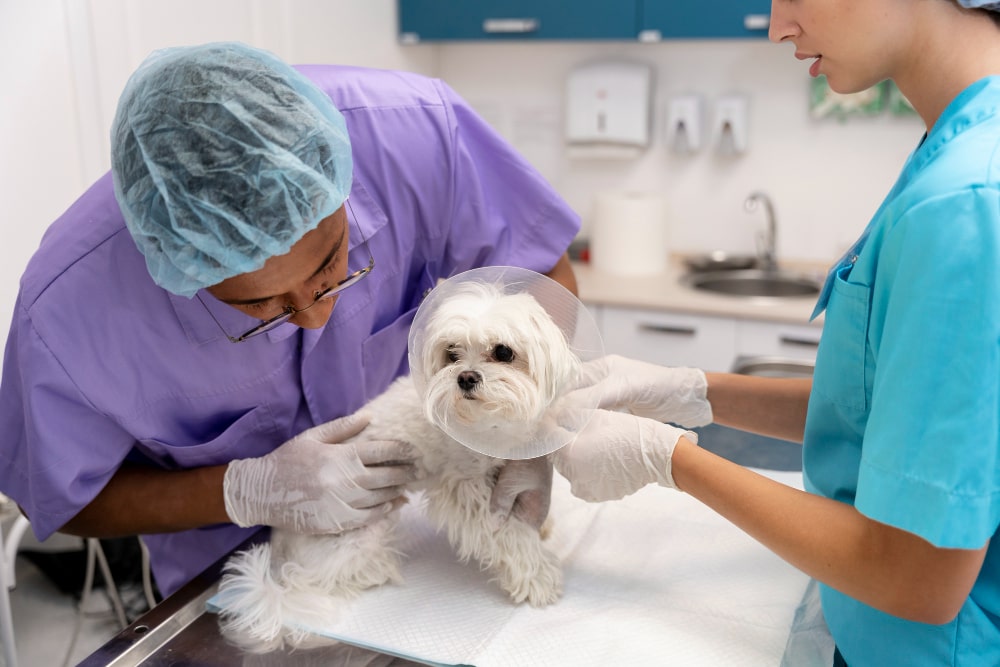Introduction: Navigating the Types of Dog Breeders for Your New Companion
When you’re ready to add a new dog to your family, understanding the types of dog breeders is crucial. This exciting journey towards finding a new companion comes with the important decision of choosing the right breeder, which significantly affects your future pet’s health and happiness. A reputable dog breeder, among the various types of breeders, ensures their puppies are healthy and well-socialized, preparing them for a joyful life with their new families.
Selecting from the types of breeders requires careful consideration, as it supports ethical breeding practices. It involves choosing breeders who prioritize the animals’ well-being, conduct thorough health screenings, and adhere to breed standards. This decision helps to promote animal welfare and combat the negative impacts of puppy mills and irresponsible breeding.
Choosing the right dog breeder is more than just finding a pet; it’s an ethical commitment to ensuring the best start in life for your new furry family member. This guide aims to shed light on the different types of dog breeders, helping you make an informed and responsible choice for your new companion.
Read more about the history of dog breeding here.
Understanding Types of Dog Breeders: Making the Right Choice

When you’re on the hunt for a new furry friend, understanding the landscape of dog breeding is essential. Dog breeders come in various forms, each with its practices, ethics, and impacts on the puppies they produce. Knowing the differences between these types of dog breed keeprs can help you make a responsible and informed decision, ensuring your future pet comes from a healthy and happy background.
1. Professional Breeders: Ensuring Quality and Ethics
Professional breeders are dedicated to the health, temperament, and quality of their chosen breed. Their breeding practices are grounded in a deep knowledge of genetics and breed standards, aiming to improve the breed with each litter. These breeders are often active members of breed clubs like the American Kennel Club and may participate in dog shows, which helps them stay informed about the breed standards of purebred dogs and the health of their breeding dogs.
Key Characteristics:
-
Health and Genetic Testing: Professional breeders conduct extensive health screenings and genetic testing to minimize the risk of hereditary diseases in their bred dogs.
-
AKC Registered Dog: Professional breeders often breed dogs that are registered with the American Kennel Club (AKC), which signifies adherence to the recognized standards for the breed. AKC registration is a hallmark of a breeder’s commitment to quality and ethical breeding practices.
-
Socialization and Care: Puppies are raised in a nurturing environment that promotes early socialization with humans and other dogs.
-
Transparency: They are transparent about their breeding practices and welcome visits from potential buyers to see the living conditions of the puppies and meet their parents.
-
After-Sale Support: Offers extensive after-sale support, including guidance on puppy care, training, and sometimes a health guarantee.
Example: A professional breeder specializing in Labrador Retrievers may be actively involved with the Labrador Retriever Club, adhere to the club’s health screening recommendations, and participate in shows to ensure their dogs meet the breed standard.
2. Backyard Breeders: Casual Breeding with Risks
A Backyard breeder is typically a dog owner who decides to breed their pet, often without a clear understanding of breeding practices or the breed’s health and welfare needs. While some may have good intentions, the lack of professional knowledge can lead to health and temperament issues in the puppies.
Key Characteristics of Backyard Dog Breeders:
-
Limited Health Screenings: May not perform the recommended health screenings or genetic testing due to lack of knowledge or to save on costs.
-
Variable Socialization: Puppies might not receive the same level of socialization or care as those from professional breeders.
-
Inconsistency: Breeding practices can be inconsistent, with little regard for improving or maintaining breed standards.
Example: A family decides to breed their Golden Retriever because they love her temperament and want to have one of her puppies, without considering the genetic health risks and responsibilities involved.
3. Hobby Breeders: Passion Meets Practice
Typically, hobby breeders breed dogs as a passionate hobby rather than a business. They may have one or two breeds they specialize in and usually produce only a few litters per year. These breeders are knowledgeable about their breed’s health and strive to produce high-quality puppies but on a smaller scale than professional breeders.
Key Characteristics:
-
Committed to Health: Like professional breeders, hobby breeders conduct health screenings and genetic testing.
-
Personal Touch: They often provide a high level of care and socialization to their puppies, given the smaller scale of their breeding operations.
-
Knowledgeable: They are usually well-informed about the breed and eager to educate potential puppy buyers.
Example: A hobby breeder of Australian Shepherds may only breed once a year, focusing on producing well-socialized puppies that excel in agility and companionship, with all necessary health checks in place.
4. Commercial Breeders and Puppy Mills: Quantity Over Quality
Commercial breeders, including those operating puppy mills, breed dogs on a large scale, often prioritizing profit over the well-being of the animals. Puppy mills are notorious for their poor living conditions, inadequate health care, and lack of socialization for the puppies.
Key Characteristics:
-
Poor Conditions: Dogs are often kept in cramped, unsanitary conditions with limited access to veterinary care.
-
High Volume: Produce many litters per year, leading to a greater risk of health and behavioral issues in puppies.
-
Lack of Transparency: May use pet stores or online ads when selling puppies, avoiding direct contact with buyers and scrutiny of their breeding practices.
Example: A commercial breeder might advertise puppies of multiple breeds available year-round, with little information about the parents or the living conditions in which the puppies were raised.
By understanding these four types of breeders, prospective dog owners can make more informed decisions that align with their values and the well-being of their future pets. Choosing a breeder who practices ethical breeding and provides a healthy, loving environment for their dogs is crucial for ensuring the health and happiness of your new companion.
Making an Informed Decision
Choosing the right type of breeder involves considering several factors:
-
Health and Genetic Testing: Look for breeders who perform comprehensive health and genetic screenings on their breeding dogs to ensure healthy puppies.
-
Socialization: Puppies should be raised in a clean, safe environment and exposed to various people, sounds, and experiences to ensure they are well-socialized.
-
Transparency: Reputable breeders will be transparent about their breeding practices and happy to answer any questions you may have. They should also be willing to show you where the puppies are raised and introduce you to the puppy’s parents.
By understanding the types of dog breeders, you’re equipped to make a choice that not only benefits you and your future pet but also supports ethical breeding practices in dog world. Choosing a responsible breeder is a significant step towards giving your new companion the best start in life, filled with health and happiness.
Ethical Considerations in Dog Breeding: Ensuring a Healthy Start for Puppies

When bringing a new puppy into your home, ethical considerations are paramount. Choosing a breeder who adheres to ethical breeding practices is crucial for the well-being of your future pet and the broader canine community. Ethical dog breeders prioritize the health, temperament, and welfare of their animals, ensuring that puppies have a healthy start in life and are well-prepared for their forever homes.
Key Aspects of Ethical Breeding
-
Health Screening and Genetic Testing: Ethical breeders conduct thorough health screenings and genetic testing on their breeding dogs to identify and prevent hereditary conditions. This proactive approach helps ensure the puppies are as healthy as possible, reducing the risk of costly and heartbreaking health issues later in life.
-
Proper Socialization: Puppies need early socialization to develop into well-adjusted adult dogs. Ethical breeders expose puppies to a variety of people, environments, and situations, fostering their social skills and helping them become confident and comfortable in different settings.
-
Living Conditions: The environment where puppies are born and raised significantly impacts their health and development. Ethical breeders provide clean, safe, and enriching spaces for their dogs and puppies, allowing for ample room to play, explore, and rest.
-
Commitment to Lifelong Welfare: Reputable breeders commit to the lifelong welfare of their puppies. They often provide new owners with resources and support, including guidance on care, nutrition, and training. They also typically offer to take back or assist in rehoming any dog if the owner can no longer care for it.
Why Ethical Breeding Matters
Choosing an ethical breeder has far-reaching implications:
-
Healthier Dogs: Ethically bred puppies are less likely to have genetic health problems, thanks to selective breeding and health screenings.
-
Better Temperaments: Proper socialization and care from a young age lead to dogs with better temperaments, making them suitable companions for families, individuals, and children.
-
Supporting Responsible Practices: By choosing an ethical breeder, you’re supporting responsible breeding practices and contributing to the welfare of all dogs by not supporting puppy mills and backyard breeders.
By prioritizing ethical considerations and doing your research, you can ensure a joyful and healthy start to your new life with your puppy.
Choosing the Right Breeder: A Comprehensive Guide for Future Dog Owners

Finding a responsible and ethical dog breeder is a critical step in ensuring your future puppy is healthy, well-socialized, and happy. This guide aims to equip you with the knowledge and tools to identify and choose the right breeder, aligning with the best practices in animal welfare and responsible pet ownership.
Identifying a Responsible Breeder
Responsible breeders share several key characteristics that set them apart from less scrupulous sources. Understanding these traits can help you make an informed decision:
-
Transparency: A responsible breeder is transparent about their breeding practices and open to questions. They should willingly share information about the puppy’s parents, health screenings, and the conditions in which the puppies are raised.
-
Health Certifications: Look for breeders who provide comprehensive health certifications for their breeding dogs. These certifications should cover genetic tests and screenings for common health issues associated with the breed.
-
Visitation Rights: Ethical breeders typically allow or even encourage potential owners to visit and see where the puppies are raised. This visit can offer insights into the breeder’s practices and the care and conditions provided to the puppies and their parents.
-
Knowledgeable: A good breeder is knowledgeable about the breed and eager to educate potential owners on the breed’s characteristics, care requirements, and potential health issues. They should provide guidance on raising, training, and caring for the puppy.
-
Lifelong Support: Responsible breeders offer ongoing support and are available to answer questions and provide advice throughout the dog’s life. They genuinely care about the welfare of the puppies they breed and are committed to their lifelong well-being.
Red Flags to Watch For
When choosing a breeder, be aware of warning signs that may indicate irresponsible or unethical practices:
-
Lack of Transparency: Be cautious of breeders who are reluctant to share information or allow you to visit their facility.
-
No Health Certifications: Avoid breeders who do not provide health clearances or genetic testing results for their breeding dogs.
-
Multiple Litters Available: Be wary of breeders who have multiple breeds or numerous litters available simultaneously. This can be a sign of a puppy mill or commercial breeding operation.
-
High-Pressure Sales Tactics: Ethical breeders will not pressure you into making a quick decision or immediately handing over a deposit.
Questions to Ask Your Breeder
To ensure you’re making the right choice, here are essential questions to ask your breeder:
-
How long have you been breeding this breed?
-
Can you provide health certifications for the puppy’s parents?
-
How do you socialize your puppies, and what experiences have they had so far?
-
Can I see the environment where the puppies are raised?
-
What is your policy if I’m unable to care for the dog at any point in its life?
Remember, choosing a responsible breeder not only benefits you and your puppy but also contributes to promoting ethical breeding practices worldwide.
Adoption as a Responsible Alternative to Buying from Breeders

While selecting the right breeder is crucial for those looking to add a specific breed to their family, it’s important to consider adoption as a responsible and rewarding alternative. Adopting a dog from a shelter or rescue organization offers a second chance to a pet in need and has numerous benefits for both the dog and the adopter.
Benefits of Adopting a Dog
-
Saving a Life: Adoption gives a dog a second chance at life. Many shelters are overcrowded, and by adopting, you’re not only providing a loving home to your new pet but also making space for other animals in need.
-
Health Advantages: Most shelters and rescue organizations ensure that dogs are vaccinated, spayed or neutered, and receive a health check before adoption. This means you’re adopting a pet that has been cared for and whose health issues (if any) are identified.
-
Cost-Effective: Adopting a dog is often less expensive than buying one from a breeder. Adoption fees usually cover the cost of vaccinations, spaying/neutering, and sometimes even microchipping, offering significant savings on initial veterinary costs.
-
Behavioral Assessments: Many shelters perform behavioral assessments on dogs before adoption, providing potential owners with information about the dog’s temperament and how well it might fit into their home and lifestyle.
-
Supporting Animal Welfare: By adopting, you support animal shelters and rescue organizations in their mission to care for and rehome pets. This choice also stands against the unethical practices of puppy mills and irresponsible breeding.
-
Unique Puppies: Animal shelters are often filled with mixed breed dogs that have unique characteristics of their purebred dog parents.
Whether you decide to buy from a reputable breeder or adopt from a shelter, the key is to make a responsible choice that considers the well-being of the dog and supports ethical practices in pet ownership.
FAQs: Navigating Common Questions on Types of Dog Breeders

When it comes to adding a new dog to your family, you may have several questions about whether to choose a breeder or consider adoption. This section aims to address some common inquiries to help you make an informed decision.
What defines a reputable breeder?
A reputable breeder is someone who prioritizes the health, well-being, and temperament of their dogs. They engage in responsible breeding practices, including thorough health screenings and genetic testing. Reputable breeders are transparent, allowing visits to see where the dogs are raised, and are committed to the lifelong welfare of the dogs they breed.
How do I verify a breeder’s claims about health and genetics?
Ask the breeder for health certifications and genetic testing results for the puppy’s parents. Reputable breeders should provide documentation of screenings for common breed-specific health issues. You can also ask professional dog breeders for references or reviews from previous buyers.
What certifications should I look for when choosing a breeder?
Look for breeders who use dogs certified by reputable veterinary and breed-specific organizations. This includes certifications for hip dysplasia, elbow dysplasia, heart conditions, and eye health from organizations like the Orthopedic Foundation for Animals (OFA) and the Canine Eye Registration Foundation (CERF).
How do I decide between adopting and buying from a breeder?
Consider your lifestyle, preferences, and what you’re looking for in a dog. Adoption can be a great option if you’re open to different breeds or mixed-breed dogs and want to offer a home to a pet in need. Choosing a breeder might be preferable if you’re interested in a specific breed, particularly for reasons related to temperament, size, or hypoallergenic qualities.
What are the signs that a puppy is healthy and well-socialized?
A healthy puppy is active, alert, and shows no signs of discomfort or illness, such as coughing, sneezing, or runny eyes. Well-socialized puppies are curious and not overly fearful of new situations or people. They should interact well with their littermates and show no signs of aggression or excessive shyness.
What is ‘type’ in dog breeding?
In dog breeding, “type” refers to the specific physical and behavioral characteristics that define a particular breed. Breeders aim to produce dogs that exemplify these traits, adhering to the breed standard as outlined by official breed clubs and registries.
What is a puppy mill vs. breeder?
A puppy mill is a commercial dog breeding facility that prioritizes profit over the health and welfare of the dogs. Conditions in puppy mills are often poor, with inadequate medical care, socialization, and living conditions. A responsible breeder, on the other hand, breeds dogs on a much smaller scale, prioritizes their health and well-being, and ensures they are well-socialized and cared for.
By understanding these aspects, you can feel more confident in your own dogs and your decision-making process, whether you choose to adopt or seek out a reputable breeder for your new canine companion.









Get involved!
Comments